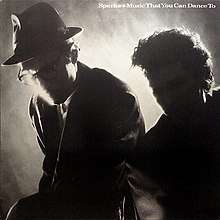Music That You Can Dance To
Music That You Can Dance To is the fourteenth studio album by American pop band Sparks. It was originally released in September 1986, on the label MCA in the US and Consolidated Allied in the UK, two years after their previous album, Pulling Rabbits Out of a Hat.
| Music That You Can Dance To | ||||
|---|---|---|---|---|
 | ||||
| Studio album by | ||||
| Released | September 1986 | |||
| Recorded | 1985–1986 | |||
| Genre | ||||
| Length | 37:17 | |||
| Label |
| |||
| Producer |
| |||
| Sparks chronology | ||||
| ||||
| Singles from Music That You Can Dance To | ||||
| ||||
| Alternative Cover | ||||
 The Best of Sparks: Music That You Can Dance To | ||||
| Review scores | |
|---|---|
| Source | Rating |
| AllMusic | |
Background
Music That You Can Dance To released 1986 was the band's most dance music inspired album since 1979's No. 1 in Heaven. The overall sound of the album was dominated by synthesizers and sequencers like the 1979 album but it differed from that release by the inclusion of the heavily distorted bass guitar of Leslie Bohem, and the emphasis on discordant sound effects.[2] "Music That You Can Dance To", "Fingertips" and "The Scene" represent some of Sparks' most Hi-NRG dance music leanings. "Shopping Mall of Love", "Let's Get Funky", and (on the original US edition) "Change" present a side of the band's sound that is discordant and experimental. Whereas "Rosebud" and the rerecording of their 1982 single "Modesty Plays" are not dissimilar from the synth-pop sound that the band had pursued on their previous two albums. "Armies of the Night" had been recorded for Fright Night (1985), the version that appeared on the European editions of Music That You Can Dance To was a re-recording.
The recording of the album was the last time that the Mael brothers worked with the line up of guitarist Bob Haag, bassist Leslie Bohem, and drummer David Kendrick. This line-up had been in place since 1981's Whomp That Sucker. Sparks next album was recorded as a duo with some guest musicians. David Kendrick joined Devo and appeared on their 1988 album Total Devo.
Release
Music That You Can Dance To was no more successful on the album charts than their previous album, Pulling Rabbits Out of a Hat, had been. It was released on a number of different record labels across different territories: MCA Records in the US, Consolidated Allied Records in the UK and Curb Records in Germany. In the US and Germany, the album substituted "Armies of the Night" for the 1985 single "Change".
"Music That You Can Dance To", "Rosebud", and "Fingertips" were each released as singles to promote the album. Each was also released as an extended remix. The UK and US remixes of "Music That You Can Dance To" were different. "Fingertips" was released as a club promo in the US and was backed with "The Scene". The club-orientated singles did not register on the mainstream charts, but did make the Billboard Hot Dance Music/Club Play chart; "Music That You Can Dance To" made No. 6 (their highest club chart peak)[3] and the Double-A-Side "Fingertips"/"The Scene" made No. 38.[3]
"Change" was released in the UK on London Records in 1985 and reached No. 85 on the UK Singles Chart.[4] The stand-alone single was promoted by an appearance on the TV show Wogan. None of the other singles were popular in the UK.
Re-release
In 1990 Curb Records re-released Music That You Can Dance To under the title The Best of Sparks: Music That You Can Dance To.[5] The release featured a different sleeve and corresponded to the US track listing, with "Change" and not "Armies of the Night". Repertoire Records reissued the album in 2011 with "Armies of the Night" as track four instead of "Change".
Track listing
All tracks are written by Ron Mael and Russell Mael, except where noted.
| No. | Title | Writer(s) | Length |
|---|---|---|---|
| 1. | "Music That You Can Dance To" | 4:21 | |
| 2. | "Rosebud" | 4:37 | |
| 3. | "Fingertips" | 4:20 | |
| 4. | "Change" ("Change" is substituted for "Armies of the Night" on Non-US editions) | 5:17 |
| No. | Title | Length |
|---|---|---|
| 5. | "The Scene" | 6:11 |
| 6. | "Shopping Mall of Love" | 3:14 |
| 7. | "Modesty Plays" (New version) | 3:59 |
| 8. | "Let's Get Funky" | 6:05 |
| Total length: | 37:17 | |
Personnel
Sparks
- Russell Mael – vocals
- Ron Mael – all synthesizers (Fairlight CMI; Roland Jupiter-8; Yamaha DX7), vocals on "Shopping Mall of Love"
- Bob Haag – Endodyne guitars; Roland synthesizers; backing vocals
- Leslie Bohem – bass guitar; backing vocals
- David Kendrick – drums
Additional personnel
- John Thomas – additional keyboards
- Robert Mache – guitar on "Fingertips"
Production
- Ron Mael – producer
- Russell Mael – producer
- Greg Penny – production on "Modesty Plays (New Version)"
References
- AllMusic review
- "TrouserPress.com :: Sparks". 2007 Trouser Press LLC. Retrieved 2009-09-22.
Sparks next made Music That You Can Dance To, an aggressively loud high-energy dance record — dynamic keyboards, mock-symphonic arrangements and Bohem's bass play a large part
- "Allmusic - Billboard Singles - Sparks". Billboard. Retrieved 2009-09-22.
- "The Official Charts Company - Sparks". Official Charts Company. Retrieved 2008-07-22.
- "TrouserPress.com :: Sparks". 2007 Trouser Press LLC. Retrieved 2009-09-22.
In an outrageous attempt to mislead, Curb's 1990 CD reissue of the album is titled The Best of Sparks: Music That You Can Dance To
External links
- Music That You Can Dance To at Discogs (list of releases)